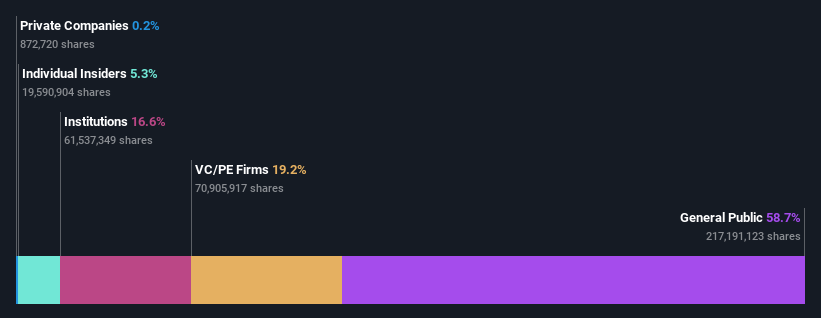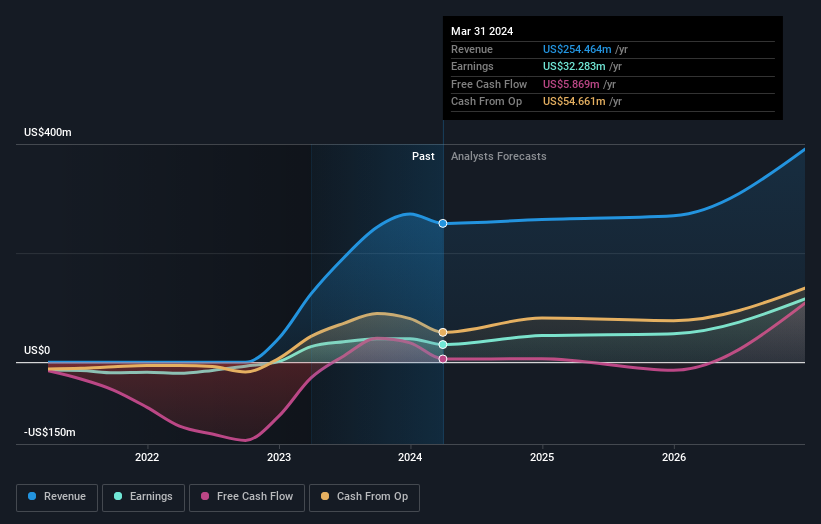Orezone Gold Corporation's (TSE:ORE) largest shareholders are individual investors with 59% ownership, private equity firms own 19%
Key Insights
Orezone Gold's significant individual investors ownership suggests that the key decisions are influenced by shareholders from the larger public
41% of the business is held by the top 25 shareholders
If you want to know who really controls Orezone Gold Corporation (TSE:ORE), then you'll have to look at the makeup of its share registry. And the group that holds the biggest piece of the pie are individual investors with 59% ownership. In other words, the group stands to gain the most (or lose the most) from their investment into the company.
And private equity firms on the other hand have a 19% ownership in the company.
Let's delve deeper into each type of owner of Orezone Gold, beginning with the chart below.
View our latest analysis for Orezone Gold
What Does The Institutional Ownership Tell Us About Orezone Gold?
Institutions typically measure themselves against a benchmark when reporting to their own investors, so they often become more enthusiastic about a stock once it's included in a major index. We would expect most companies to have some institutions on the register, especially if they are growing.
Orezone Gold already has institutions on the share registry. Indeed, they own a respectable stake in the company. This implies the analysts working for those institutions have looked at the stock and they like it. But just like anyone else, they could be wrong. If multiple institutions change their view on a stock at the same time, you could see the share price drop fast. It's therefore worth looking at Orezone Gold's earnings history below. Of course, the future is what really matters.
We note that hedge funds don't have a meaningful investment in Orezone Gold. Looking at our data, we can see that the largest shareholder is RCF Management, LLC with 19% of shares outstanding. In comparison, the second and third largest shareholders hold about 4.7% and 4.3% of the stock. In addition, we found that Patrick Downey, the CEO has 1.8% of the shares allocated to their name.
On studying our ownership data, we found that 25 of the top shareholders collectively own less than 50% of the share register, implying that no single individual has a majority interest.
Researching institutional ownership is a good way to gauge and filter a stock's expected performance. The same can be achieved by studying analyst sentiments. Quite a few analysts cover the stock, so you could look into forecast growth quite easily.
Insider Ownership Of Orezone Gold
While the precise definition of an insider can be subjective, almost everyone considers board members to be insiders. The company management answer to the board and the latter should represent the interests of shareholders. Notably, sometimes top-level managers are on the board themselves.
Most consider insider ownership a positive because it can indicate the board is well aligned with other shareholders. However, on some occasions too much power is concentrated within this group.
We can see that insiders own shares in Orezone Gold Corporation. It has a market capitalization of just CA$255m, and insiders have CA$14m worth of shares, in their own names. It is good to see some investment by insiders, but we usually like to see higher insider holdings. It might be worth checking if those insiders have been buying.
General Public Ownership
The general public, who are usually individual investors, hold a substantial 59% stake in Orezone Gold, suggesting it is a fairly popular stock. This size of ownership gives investors from the general public some collective power. They can and probably do influence decisions on executive compensation, dividend policies and proposed business acquisitions.
Private Equity Ownership
With an ownership of 19%, private equity firms are in a position to play a role in shaping corporate strategy with a focus on value creation. Some might like this, because private equity are sometimes activists who hold management accountable. But other times, private equity is selling out, having taking the company public.
Next Steps:
It's always worth thinking about the different groups who own shares in a company. But to understand Orezone Gold better, we need to consider many other factors. For instance, we've identified 3 warning signs for Orezone Gold that you should be aware of.
If you would prefer discover what analysts are predicting in terms of future growth, do not miss this free report on analyst forecasts.
NB: Figures in this article are calculated using data from the last twelve months, which refer to the 12-month period ending on the last date of the month the financial statement is dated. This may not be consistent with full year annual report figures.
Have feedback on this article? Concerned about the content? Get in touch with us directly. Alternatively, email editorial-team (at) simplywallst.com.
This article by Simply Wall St is general in nature. We provide commentary based on historical data and analyst forecasts only using an unbiased methodology and our articles are not intended to be financial advice. It does not constitute a recommendation to buy or sell any stock, and does not take account of your objectives, or your financial situation. We aim to bring you long-term focused analysis driven by fundamental data. Note that our analysis may not factor in the latest price-sensitive company announcements or qualitative material. Simply Wall St has no position in any stocks mentioned.

 Yahoo Finance
Yahoo Finance 

